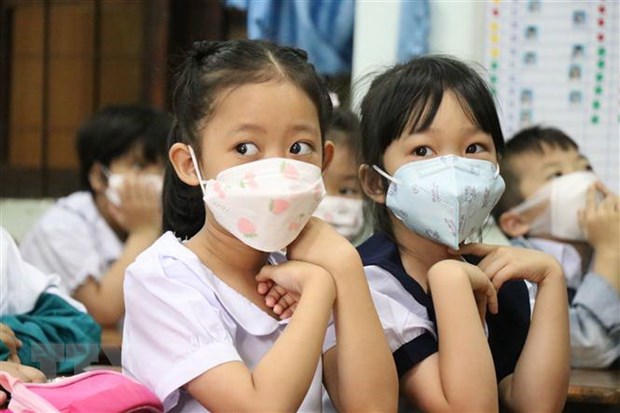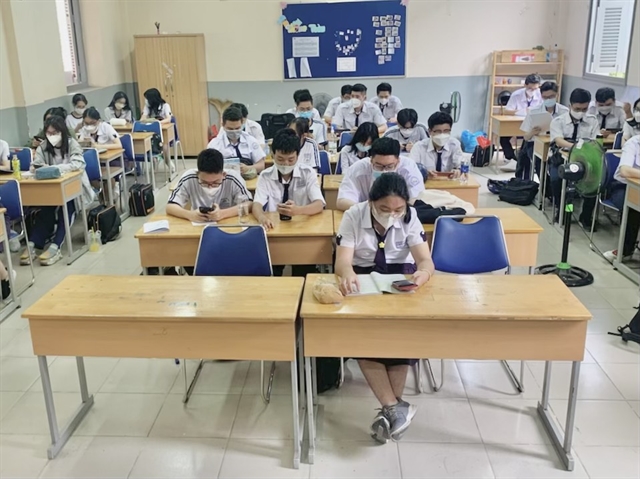 Society
Society

Several problems that have arisen since students returned to HCM City schools after the Tết holiday have left all stakeholders – parents, teachers, students and others – worried and anxious.

|
| Primary students wear masks all the time, during classes and while engaging in other activities. — VNA/VNS |
By Hoàng Như
HCM CITY — Several problems that have arisen since students returned to HCM City schools after the Tết holiday have left all stakeholders – parents, teachers, students and others – worried and anxious.
Most prominent of all the problems is the rapid rise in the number of COVID-19 infections among students of all grades.
In HCM City, more than 44,000 students and teachers are said to have COVID-19 symptoms, including four thousand cases detected in schools.
Since students under grade seven have not been vaccinated, parents are concerned about how the virus would affect their children’s health.
Bình Thạnh District resident Đăng Khoa, 35, whose daughter in the fifth grade has tested positive for the novel coronavirus, was extremely worried when she got the news because the girl has not been vaccinated.
“The common symptoms are high fever and continuous cough. My child suffered it for the first two days,” Khoa said.
Although children are able to recover faster than older people, they still have to face post-COVID effects on their health.
Thanh Diệu, another Bình Thạnh resident, said many of her daughter’s classmates got infected recently and have had to stay back home.
“I am considering letting my kid take a few days off. My child’s safety is much more important,” she said.
The Bế Văn Đàn Primary School in Bình Thạnh has decided to create YouTube videos on math and Vietnamese for students who cannot attend offline classes. Teachers will also contact parents to give students daily homework.
“It’s hard for me to take an extra class online at night for those who’ve got infected… the timetable is not appropriate,” said Minh Trang, who teaches at the school.
Parents are also in a difficult situation, having to work and care for their children at home. Many people have chosen to work from home temporarily.
“Despite being at home, I still have the same workload and do not have much free time,” said Diệu.
“Sometimes, I try to explain a new lesson to my child after watching the video, but she can’t get it, because I do not have the teaching skills that teachers have.”
Half-boarding service
Nguyễn Hữu Hưng, deputy director of the city’s Department of Health, said the convenience of a half-boarding service, where children can rest in the school premises after or in between classes, has become undeniable now.
Many parents cannot travel every noon to provide children with lunch and take them home for a nap, he noted.
“If schools can organise half-boarding services carefully, the spread of the virus can be controlled,” Hưng said.
The HCM University of Education has postponed the return of students because of the increase in the number of COVID-19 cases. Students are attending online classes for all subjects except for military training.
In this situation, many students are trying to decide whether they should go back to their hometowns for online learning or stay in the city.
Tiến Anh, a junior student at the university, said: “If I go home now, it will be difficult for me to find another house when I return.”
However, the cost of living in HCM city is high, for many students.
Yến Nhi, 21, another student at the university, said: “I am thinking of returning to my hometown to cut down on monthly expenses, though the school can make unexpected changes to the schedule.”
Choices, flexibility

|
| Students of the Nguyen Thi Minh Khai High School use mobile phones to attend a history class on the K12 app because their teacher has tested positive for the virus. Photo Hoàng Như |
The municipal Department of Education and Training has assigned to each school principal the task of deciding on the appropriate and flexible form of learning: face-to-face, online or a combination of both - in the new normal circumstances.
The Nguyễn Thị Minh Khai High School in District 3 has come up with new regulations to flexibly adapt to the current situation while maintaining students’ safety and efficient provision of knowledge.
Accordingly, those that have come within two metres of F0 cases have to take five days off. Any class that has the number of F0 and F1 cases accounting for over half the total number of students will switch to online learning for the next five days.
If teachers get infected, students still go to school and meet teachers online via the K12 app (an online program that allows teachers to post videos and live stream lessons) on their smartphones.
Bùi Quang Triều, a grade 12 student at the high school, said he was distressed because the lack of communication with teachers and classmates made it difficult for him to understand certain subjects and concepts.
“In fact, the technical issues of learning online are not a big deal for high school students. However, we do not have sufficient opportunities to do teamwork on projects or further explore lessons with each other.
“The upcoming final exam worries us a lot,” said Triều.
Hưng said prolonged online learning can greatly affect students’ psychological and physiological development, especially teenagers.
“It can lead to problems like myopia, astigmatism and scoliosis,” he added.
Experts have called for better medical rooms and healthcare services at schools as well as increased physical activity towards maintaining the health of students.
They have also said that the government should speed up vaccination of children under 12 and take all other steps to ensure that COVID-19 becomes a “normal sickness” like the flu. — VNS